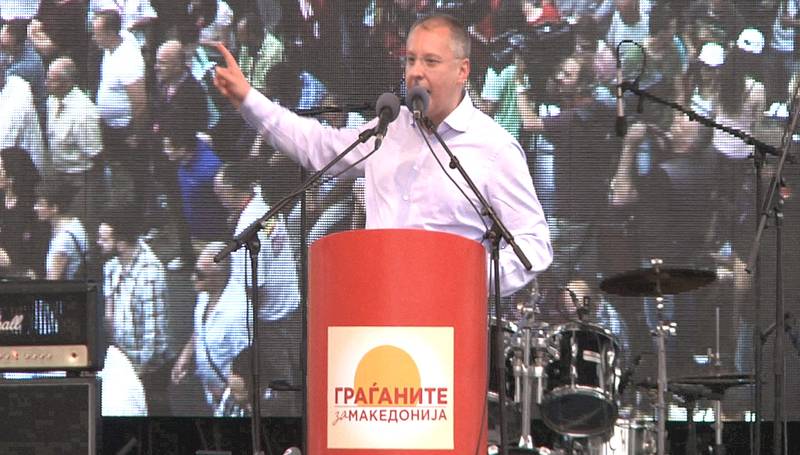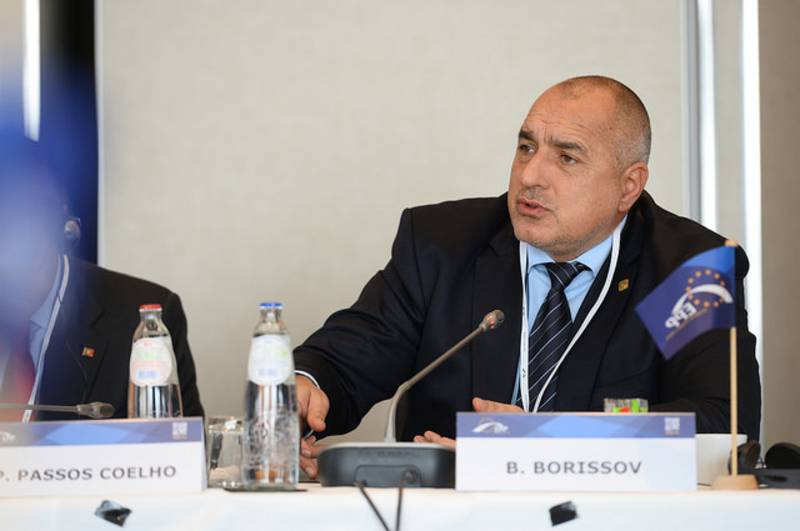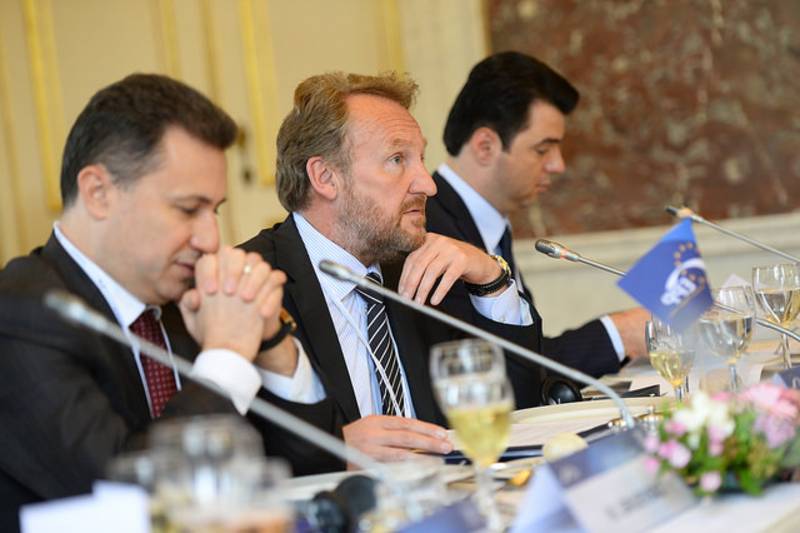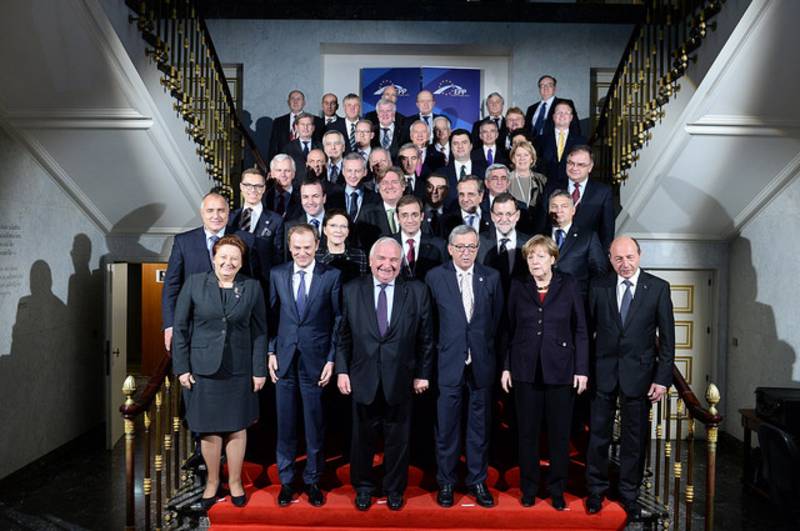The Shameful Hypocrisy of European Political Parties
Adelina Marini, May 20, 2015
With its inaction the EU has a huge responsibility for allowing Macedonia to turn from one of the most prospective candidate countries in the Western Balkans into one of the toughest cases in the region. In the words of Vesna Pusic, Croatia's first deputy prime minister and minister of foreign and EU affairs, Macedonia is currently the most sensitive spot in the region from the non-EU countries that are situated among member countries. The latter is a very important remark because it reveals the knowledge that the neighbouring countries of Macedonia which are EU member states are direct participants with their actions or inactions in the process of sinking of the former Yugoslav republic. The member states, however, are not the only ones to bear heavy responsibility. Their fair share should take the European political parties as well which, in the name of political majorities, trample completely consciously on the very values they have been founded upon.

A very frustrating example of ugly political hypocrisy is the participation in the opposition protest in Skopje of the Party of European Socialists' chief Sergey Stanishev. There are several reasons that cannot be ignored why Mr Stanishev should have not attended the protest. The first is that he has been a leader for more than a decade of the Bulgarian Socialist Party (BSP) which inherited without discussion and condemnation of the past the totalitarian Bulgarian Communist Party (BKP). It seems somewhat absurd the chief of a European political party not to have condemned the crimes of totalitarian regimes given that the European Parliament, where the Socialists are the second largest political grouping, did that in a resolution of 2009.
In that resolution, among others, is underlined the importance of keeping the memories from the past alive "as there can be no reconciliation without remembrance". It reaffirms also the united position against all totalitarian regimes no matter what ideological ground they are based upon. In the document, adopted 6 years ago on 2 April it is recalled that the most recent crimes against humanity and the acts of genocide in Europe were still taking place in July 1995 and is said that "constant vigilance is needed to fight undemocratic, xenophobic, authoritarian and totalitarian ideas and tendencies". In the same document countries from Central and Eastern Europe are called to open the archives of the secret services ensuring, however, that there will be no abuse for political purposes.

On all these points Mr Stanishev has a lot to answer for while in the same time he is seeking a second term as PES chairman. Another reason why his attendance looked ludicrous in Macedonia is that the period of his rule in Bulgaria was marked by a majority of corruption scandals and abuse with power. To such an extent that the European Commission even froze two of the biggest operational programmes financed with EU money. Moreover, it was during Mr Stanishev's governance that Bulgaria was accepted in the EU with a special mechanism in the area of justice because it proved incapable to complete the reforms of the judiciary which aimed to establish rule of law. How do words like 'rule of law' sound from the mouth of a man who has failed precisely on this issue in his own country?
A third reason is that as a complier of Mr Plamen Oresharski's government in 2013 Sergey Stanishev was practically an accomplice in one of the most shocking actions of a government so far - the appointment of the controversial figure of Delyan Peevski to head the State Agency for National Security (DANS). This triggered a powerful wave of massive protests in June 2013 which, however, Mr Stanishev claimed were organised with the aim to hold early elections. As if there is something wrong in demanding early elections when it is evident that the government is abusing the confidence of its voters. Stanishev's party not only used the same claims as Macedonia Prime Minister Nikola Gruevski (a political opponent of his) that the protesters were paid by Soros, or as they were later nicknamed 'sorosoids', but it also organised counter-protests. BSP used its media influence (through Peevski's media empire) to sow division in society. During the siege of the parliament on the night of 23 July (a month into the protests) he said that outside were just 200-300 people whereas the entire square around the National Assembly was packed with people who wanted to tear up with the oligarchic model and a return to democracy and rule of law.
Against this backdrop, Sergey Stanishev's words in Skopje - "We are in Skopje today to support Macedonian citizens who want democracy, rule of law and transparent institutions" - sound extremely cynically and shamefully. Why the protesters in his own country, moreover not organised by anyone, were 'sorosoids' and the protesters under the flags of a party affiliated with PES wanted democracy? The question is a rhetorical one. However, this is accumulating to PES's account by making every statement of theirs on democracy, rule of law and human rights much lighter and insignificant.
EPP's sins
The other big European party is not less responsible and not only in Macedonia. The party never stopped to support its affiliate VMRO-DPMNE, despite that its leader Nikola Gruevski is in power longer than Vladimir Putin (since 2006) thanks, to put it mildly, to controversial electoral practises. It was precisely during Gruevski's governance that Macedonia collapsed in all possible indices for media freedom and human rights. Instead of the EPP to use its own statute and criticise its Macedonian member, on the contrary, it was encouraged. In the same way as EPP leader Joseph Daul welcomed last year the electoral victory of Victor Orban in Hungary. "The people of Hungary have renewed their confidence in PM Orban and his government because he has always spoken the truth to them and because he implemented courageous reforms, which put the country's economy back on track".

Not a word about Orban's authoritarianism and his public statement that he renounces the liberal values and embraces an illiberal new regime which is in absolute contradiction with EPP's values and EU's most of all. The situation in Hungary, by the way, was finally a subject of debate in the European Parliament on Wednesday (19 May) despite the previous attempt that failed thanks to the EPP. The right-liberal political family has sinned in Bulgaria as well by supporting unconditionally GERB and their leader (currently a second time prime minister) Boyko Borissov, despite the fact that during his first government Bulgaria collapsed tens of seats in the press freedom index. On the account of GERB is also the fact that not only there is no progress under the Cooperation and Verification Mechanism (CVM) but regress is reported. All this under the completely uncritical eye of the EPP.

You are undermining the very foundations of the EU!
The behaviour of the European political parties in such situations when they are expected to at least show courage and persistence in defending their own values is harmful not only for the affected countries and the rebelling citizens there but for the EU itself. In the past years, eurosceptic and anti-systemic parties have been gaining more and more popularity in EU and the reason is not just the economic crisis. A large share in this various protest vote have also the intolerable compromises the mainstream parties make with EU's fundamentals. The fact that under the big European political families' watch the nationalistic and xenophobic rhetorics has returned in Europe is more than a manifestation of the outcome of their flirting with regimes that are hostile to the European values. And unless an end is put to all this the EU will lose the very reason for its existence - why do we need values on paper if we cannot enjoy them in practise because there is no one to defend them on our behalf?
 Bakir Izetbegovic, Andrej Plenkovic | © Council of the EU
Bakir Izetbegovic, Andrej Plenkovic | © Council of the EU Aleksandar Vucic, Recep Tayyip Erdogan | © Serbian Presidency
Aleksandar Vucic, Recep Tayyip Erdogan | © Serbian Presidency Jean-Claude Juncker, Zoran Zaev | © European Commission
Jean-Claude Juncker, Zoran Zaev | © European Commission